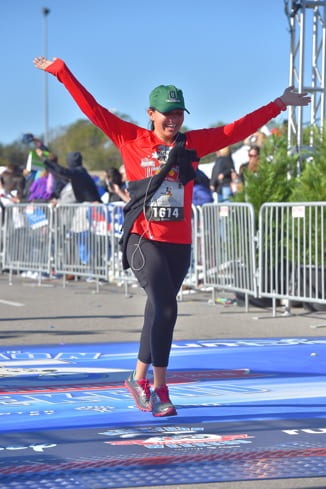Even as athletes who challenge our bodies every day, we often forget about our physical selves during a workout and focus far more on the mental side. “Your brain gets tired before your legs,” is something we have all heard, and for a lot of us, triathlon is less about what our physical bodies can actually do, and more about what we can push ourselves mentally to accomplish. The incredible drive and persistence of our team really shows during our time spent working out and racing, but the mental challenge that can be the most difficult, and often the hardest to detect, happens when we aren’t working out - during that time when our minds are left to their own devices and aren’t distracted by the burning in our lungs or the freeing feeling of our feet against the pavement.
What I’m talking about are the moments when our minds - wired to want to be the best at everything - fixate on the appearance of our bodies instead of their performance. This is at it’s worst when you’re surrounded by athletes that look a certain way, maybe like the stereotypical endurance athlete: lean, light, and graceful, and you feel out of place among them. These are the moments when our own minds can turn against us and attack the physical bodies that work so hard to get us through the miles. Your own voice might be telling you that if you don’t look a certain way, if you don’t look how an endurance athlete is “supposed” to look, then how could you possibly perform like one?
If this sounds familiar to you, you’re not alone. It happens to me all the time, daily even. Body image is one of the biggest obstacles I’ve faced in triathlon (and in other sports I’ve competed in in the past), and what’s sad is that instead of believing in the hours of hard work I put into training, sometimes I’m only confident in how I will perform if I look a certain way.
When the Tri Team women met with Olympian Sarah B. True, I asked her if she has ever struggled with body image while competing at the elite level. She replied that of course she has, but that she ultimately came to the realization that what her body could do was far more important than how it looks. I appreciated her honesty, because it is comforting to know that even an athlete as accomplished as she is still sometimes doubts herself in the same ways I do.
I thought it was important to write this post because I don’t want any Tri Team member to feel this way and think that they are the only one. Our insecurities about our bodies can feel so personal that it doesn’t occur to us that anyone else could possibly care, but I want you to know that I do. I understand better than you might guess what it’s like to live with a little negative voice sharing space in your head. I’m working hard to kick that little voice out of my space, but I haven’t been doing it alone. Tri Team is an incredible resource for support, friendship, and genuine compassion that I have not found anywhere else on campus. There have been teammates I didn’t even know very well looking out for me and my mental health on a regular basis. If this sounds like anything you’ve been struggling with, I’d love to help you kick your little voice out too, so you can all get back to focusing on the amazing things your bodies can accomplish.
Sbr,
Emma
About the Author
Emma Rodriguez is a ‘20 studying Psychology and Women’s Studies. She enjoys banana and almond butter sandwiches and Collis salads. Her favorite (and slowest) leg of the triathlon is the run.
